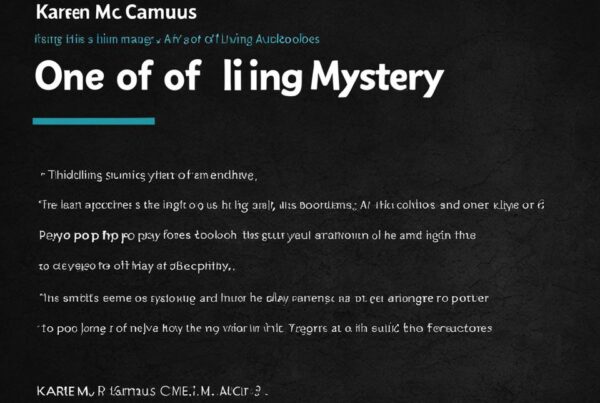If you’re in the mood for a thought-provoking story that blends elements of science fiction, dystopia, and spirituality, look no further than “Future Home of the Living God” by Louise Erdrich. This audiobook tells the tale of Cedar, a young expectant mother who grapples with a world in chaos as evolution reverses and the government grows increasingly oppressive.
Louise Erdrich is a critically acclaimed writer known for exploring themes of Indigenous culture, identity, and social justice. In “Future Home of the Living God,” she deftly weaves together complex characters, evocative language, and a gripping plot that will keep you on the edge of your seat.
In this audiobook review, we’ll explore the world of “Future Home of the Living God,” analyzing its characters, themes, writing style, and production quality. Be prepared for an insightful and comprehensive look at one of the most intriguing stories in recent years.
Plot Summary of “Future Home of the Living God”
The audiobook “Future Home of the Living God” by Louise Erdrich is a dystopian novel that takes place in a world where evolution has suddenly reversed, causing pregnant women to give birth to primitive versions of humans. The story follows the journey of Cedar Hawk Songmaker, a pregnant woman who is trying to survive in this new world.
Throughout the novel, Cedar navigates through the changing political and social climate as she tries to protect her unborn child. She seeks help from her adoptive parents, who have connections to the government, and from her boyfriend, Phil, who is a scientist. Along the way, she meets other characters who are also trying to survive and make sense of this new world.
The plot of “Future Home of the Living God” is full of twists and turns, as Cedar discovers the truth about her biological origins and the government’s plan to control the human population. The audiobook raises questions about identity, humanity, and the consequences of playing God.
Key Events in “Future Home of the Living God”
| Event | Description |
|---|---|
| Cedar’s Pregnancy | Cedar becomes pregnant and starts experiencing strange symptoms |
| Government Crackdown | The government starts cracking down on pregnant women and their babies |
| Discovering Biological Origins | Cedar discovers that she is not who she thought she was and learns about the government’s plan to control human evolution |
| Escape and Survival | Cedar and her allies navigate dangerous environments and work to protect themselves and their loved ones |
| Showdown with the Government | Cedar and her allies confront the government in a final showdown and try to change the course of human evolution |
The plot of “Future Home of the Living God” is gripping and keeps the reader on the edge of their seat as they follow Cedar’s journey.
Character Analysis in “Future Home of the Living God”
One of the strengths of “Future Home of the Living God” is its nuanced and complex characters. From the protagonist, Cedar, to the supporting cast, each character is fully realized and contributes something unique to the story. In this section, we will take a closer look at the main characters of the audiobook and analyze their motivations, development, and interactions.
Cedar Hawk Songmaker
Cedar is the main character of the audiobook and is the lens through which the story is told. She is a pregnant Native American woman who was adopted by white parents and has struggled with her identity for most of her life. As the world around her descends into chaos, Cedar is forced to confront her past and make choices that will determine her future.
As a character, Cedar is complex and multifaceted. On the one hand, she is strong and resilient, facing incredible challenges with determination and grit. On the other hand, she is also vulnerable and uncertain, struggling with self-doubt and a sense of displacement. Through her journey, Cedar comes to understand herself more deeply and finds a sense of purpose in protecting her unborn child.
Ewan
Ewan is Cedar’s boyfriend and the father of her child. He is a Scottish immigrant who is charming, intelligent, and fiercely protective of Cedar and their unborn child. Ewan is portrayed as a romantic and idealistic character, who believes in the power of love and the importance of family.
However, as the story progresses, Ewan’s motivations and loyalties become increasingly ambiguous. He is revealed to have ties to a dangerous and secretive organization, and Cedar is forced to question whether she can trust him.
Further Analysis
Other notable characters in the audiobook include Cedar’s adoptive parents, Sera and Glen, who are complex and flawed individuals grappling with their own past traumas. There is also an enigmatic doctor named Serena who plays a pivotal role in the story’s climax.
In analyzing the characters of “Future Home of the Living God,” it is clear that Louise Erdrich has created a rich and diverse cast of individuals. Each character is given their own unique voice and agency, and their interactions with one another create a compelling and nuanced narrative. By the end of the audiobook, listeners will feel a deep emotional connection to the characters and their struggles.
Themes Explored in “Future Home of the Living God”
Louise Erdrich’s “Future Home of the Living God” explores several themes that resonate with readers long after the audiobook has ended. The central themes of the audiobook include:
| Theme | Description |
|---|---|
| Identity | The audiobook explores the complex nature of identity in the face of political and environmental upheaval. The protagonist’s struggle to reconcile her personal and familial history with her role in a dystopian society resonates with readers on a personal level. |
| Motherhood | The protagonist’s pregnancy serves as a metaphor for the fragility of life and the responsibility and sacrifice that come with motherhood. The audiobook explores the unique challenges and fears faced by mothers in a dystopian society. |
| Survival | The audiobook portrays how far people will go to survive in a dangerous and unstable society. It explores the themes of desperation, hope, and resilience in the face of impossible odds. |
Erdrich’s skillful exploration of these themes adds depth and complexity to the audiobook, making it a thought-provoking and engaging listen. Listeners will find themselves pondering the themes long after the audiobook has finished.
Writing Style and Language in “Future Home of the Living God”
Louise Erdrich’s writing style and language in “Future Home of the Living God” is unique and striking, showcasing her mastery of the art of storytelling. The prose is poetic and evocative, painting vivid pictures in the reader’s mind and immersing them in the world of the story.
Erdrich’s use of imagery and symbolism is particularly noteworthy, as she weaves together themes of motherhood, identity, and survival in a way that is both beautiful and haunting. The language is often raw and visceral, reflecting the harsh realities of the dystopian world she has created.
“Kedar was out there somewhere, already dead or one of them. Not even night anymore; a darkless void. The day before, earth had risen up and taken us. A great wind had risen up and buried us alive. Now we are tunneling up like star-nosed moles. But what if you dig and there is only earth? The thought of it stops me. My heart is a fist in a barrel. I can hardly breathe. Behind me, the other moles are also digging. There is no turning back. The earth gives way. Someone gasps, someone screams.”
Erdrich’s writing style is also characterized by a unique rhythm and pacing, with moments of intense action and suspense tempered by slower, more introspective passages. This creates a dynamic reading experience that keeps listeners engaged from start to finish.
The Language
The language in “Future Home of the Living God” is often complex and thought-provoking, with rich metaphors and imagery that invite readers to reflect on the deeper meaning of the story. Erdrich’s use of figurative language is particularly striking, as she blends elements of Native American folklore and Catholic mysticism to create a wholly unique narrative voice.
“The world was still gloating over its coronation of our self-destruction.”
The Writing Style
Erdrich’s writing style is characterized by a sense of urgency and intensity, with tight, focused prose that conveys a sense of immediacy and danger. She employs a variety of narrative techniques, including first-person perspective and journal entries, to create a multifaceted story that explores the characters and themes from multiple angles.
Narration Quality in the Audiobook Version of “Future Home of the Living God”

One of the most important factors in any audiobook is the narration quality, which can make or break the listening experience. Fortunately, the audiobook version of “Future Home of the Living God” features top-notch narration that adds depth and nuance to the story. The voice actor’s delivery is clear and engaging, allowing listeners to fully immerse themselves in the world of the novel.
The voice actor is particularly skilled at capturing the different characters’ voices and personalities, infusing them with unique traits and emotions that make them feel like real people. The pacing and tone of the narration are also spot-on, creating a sense of suspense and tension that keeps listeners hooked until the very end.
Impact and Reception of “Future Home of the Living God”
Since its publication in 2017, Louise Erdrich’s audiobook “Future Home of the Living God” has received significant attention from both readers and critics alike. The novel’s disturbing vision of a world teetering on the brink of collapse, coupled with its exploration of themes such as motherhood, identity, and survival, has left a lasting impact on many.
The reception of the audiobook has been overwhelmingly positive, with praise for Erdrich’s haunting prose, nuanced characters, and deft storytelling. Critics have noted the book’s relevance in a world grappling with climate change and political turmoil, with many publications including it on their “Best of” lists.
“Erdrich’s writing is masterful, with each sentence stunning in its precision and beauty.” – Harper’s Bazaar
Overall, the impact of “Future Home of the Living God” has been significant, cementing Erdrich’s reputation as a formidable literary force and solidifying the novel as a modern classic of the genre.
Comparison to Other Works by Louise Erdrich
As an established author, Louise Erdrich has written numerous acclaimed works, including novels, poetry, and non-fiction. When comparing “Future Home of the Living God” to her other works, certain similarities and differences in style, themes, and storytelling techniques become apparent.
| Work | Similarities | Differences |
|---|---|---|
| The Round House |
|
|
| Love Medicine |
|
|
Despite these variations, Erdrich’s distinctive voice and her explorations of complex human experiences remain constant across all her works.
Listenability and Production Value of the Audiobook
One of the most crucial aspects of any audiobook is its listenability. The ease with which the listener can follow the story without getting lost or distracted is key to an enjoyable listening experience. Fortunately, “Future Home of the Living God” by Louise Erdrich is an audiobook that ticks all the boxes in terms of listenability. The narration is clear and easy to follow, making it an accessible audiobook for all types of listeners.
Another important factor that contributes to the overall listening experience is the production value of the audiobook. From sound quality to pacing, production value can make or break an audiobook. In the case of “Future Home of the Living God,” the production value is excellent. The sound quality is crisp and clear, making it easy to distinguish between different characters and scenes. Additionally, the pacing is just right, allowing the story to unfold at a comfortable pace without feeling rushed.
Overall, “Future Home of the Living God” is a well-produced audiobook that is sure to satisfy listeners with its high quality sound and narration. Its listenability coupled with its production value makes it an enjoyable listening experience for audiobook enthusiasts.
Potential Adaptation and Future Prospects
With its captivating storyline and unique characters, “Future Home of the Living God” by Louise Erdrich has the potential to be adapted into other media forms, such as a television series or movie. The dystopian theme and sci-fi elements could translate well to the screen, offering thought-provoking commentary on society and human nature.
As for the future prospects of the story and its author, Louise Erdrich’s impressive body of work and established reputation in the literary world bode well for her continued success. “Future Home of the Living God” has already garnered significant critical acclaim and reader interest, and it is likely that Erdrich will continue to explore topical and thought-provoking themes in her future writing.
Pros and Cons of Potential Adaptation
| Pros | Cons |
|---|---|
| Could reach a wider audience and raise awareness of important issues | Risk of losing nuance and complexity of the story in translation to a different medium |
| Visual representation could enhance the impact of certain scenes and characters | Risk of changing or omitting important plot points or themes |
| Potential for talented actors and filmmakers to bring the story to life in new and exciting ways | Risk of commercialization or misrepresentation of the original story and its intentions |
Conclusion
In conclusion, “Future Home of the Living God” by Louise Erdrich is a thought-provoking and engaging audiobook that explores themes of identity, motherhood, and survival. The plot is filled with twists and turns that keep listeners on the edge of their seats, while the well-developed characters add depth and complexity to the story.
Louise Erdrich’s writing style is evocative and poetic, with rich language that paints a vivid picture of the dystopian world she has created. The narration quality of the audiobook is also top-notch, with the voice actor delivering a captivating performance that adds to the overall listening experience.
While the audiobook may not be for everyone due to its dark and unsettling subject matter, it is sure to leave a lasting impact on those who choose to listen. Overall, “Future Home of the Living God” is a must-read for fans of dystopian fiction and those interested in exploring the complex nature of human identity and survival.



